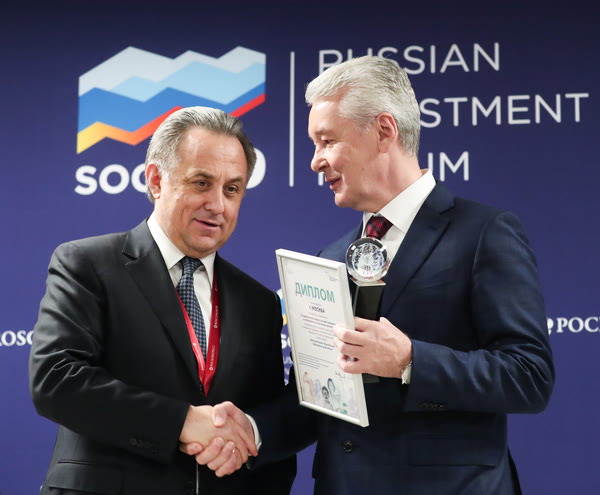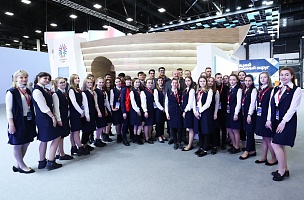KEY CONCLUSIONS
Best practices and techniques are an important tool for implementing national projects
«Right now, we have some serious work ahead of us. Six years of implementing national projects that require serious, systematic work. Leveraging best practices could yield a serious advantage in achieving these objectives, because now we can turn to a data bank and get these solutions. We also end up gaining the opportunity to save a lot of time and money when implementing projects. <...> Everything related to best practices and techniques is a vital institution supporting the development of our country,» Vladimir Yakushev, Minister of Construction, Housing, and Utilities of the Russian Federation.
Russia’s regions submitted over 700 projects to the competition
«From time to time we come up with something, we research, we have new teams join federal subjects... All of these tried and tested practices can be taken and immediately implemented. This year, 77 regions in the Russian Federation submitted over 700 projects to the competition. These are truly best practices, which have the support of local municipalities, federal subjects, but the most important thing is, that these are completed projects. They can then be collected and shared across Russia,» Vitaly Mutko, Deputy Prime Minister of the Russian Federation.
«The federal centre must provide a sense of direction, while the regions handle concrete practices and the transformation matrix. Aside from best practices, we have to facilitate the formation of creative human capital, people capable of participating in implementing best practices in each region,» Yevgeny Savchenko, Governor of Belgorod Region.
The recipe for best practices is getting the population involved in solving problems
«With Moscow, our primary objective was always to solve the concrete problems that were of concern to the public. We identified them and concentrated on them. And when we saw that we were successful, primarily through the response of our residents, which was our primary focus. A pleasant bonus to this response were our successes across a various number of ratings. For example, we had never thought that our ’Moscow Electronic School’ would turn into a unique international project. <...> The project’s success was in large part determined by the fact that we gave educators the ability to independently shape the content. And, having created this product, we realized that it would be a good idea to share it with other regions,» Sergei Sobyanin, Mayor of Moscow.
PROBLEMS
Lack of information infrastructure for leveraging best practices
«The majority of our systems are closely tied to our information infrastructure, which made the process of getting other regions connected more difficult. <...> Breakthroughs are possible, as long as we unite the efforts of federal powers, regional powers, and work together,» Sergei Sobyanin, Mayor of Moscow.
Administrative pressure on businesses
«In order to see our businesses develop, we need to create the appropriate infrastructure and mechanisms that will get small businesses involved in large projects or help them have access to these projects. We need to understand our weaknesses. And our weak spot is administrative pressure,» Rustam Minnikhanov, President of the Republic of Tatarstan.
SOLUTIONS
Creating a repository of best practices
«The President of the Russian Federation has given the Ministry a separate directive that we are working on — multiple-use projects. We recently inventoried our collection of multiple-use projects and determined that we have approximately 800 of them. Of them, only about 35 are ready for use, as the others require some serious work before they can be implemented. But if this databank is continuously improved upon, then it will help save the subjects of the Russian Federation time and an enormous amount of money in their active participation in the National Projects,» Vladimir Yakushev, Minister of Construction, Housing, and Utilities of the Russian Federation.
«We decided to create a simplified, out-of-the-box solution for the best 25 projects, which we could then share with and use in other regions. These are mutually beneficial projects such as, for example, our ’Supplier Portal’,» Sergei Sobyanin, Mayor of Moscow.
«We created the portal ’Vetted Business’ and have already received 70,000 responses in the last year. This is a specific tool that we use to understand how well the changes we’ve been implementing are helping solve problems,» Rustam Minnikhanov, President of the Republic of Tatarstan.
Developing criteria for selecting best practices
«In the next month we will prepare a set of criteria for selecting best practices. They will become a part of the Smartek database and will directly correlate to the 12 National Projects, on topics such as the environment, urban development, the construction of accessible housing, demographic improvement practices, healthy lifestyle campaigns, and more. And we expect to collect these practices, not just from the subjects of the Russian Federation, but also from federal ministries and agencies, as well as development institutions,» Svetlana Chupsheva, General Director, Agency for Strategic Initiatives to Promote New Projects.
Creating communication channels for exchanging best practices
«We are examining in detail how our regional decisions affect or don’t affect the lives of people on the ground, in a concrete city or district. And this helps create a piggy bank of ideas that can then be implemented on location. And it’s good that, now, our direct communications channels will be supplemented by the Smartek database of best practices,» Andrey Nikitin, Governor of Novgorod Region.






